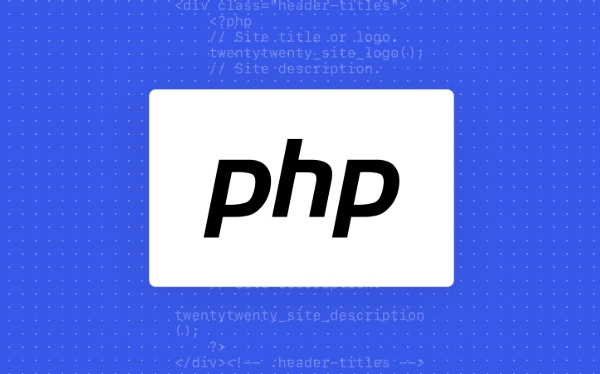 Backend Development
Backend Development
 PHP Tutorial
PHP Tutorial
 A Performance Deep Dive: Analyzing do-while Loop Overhead in PHP
A Performance Deep Dive: Analyzing do-while Loop Overhead in PHP
A Performance Deep Dive: Analyzing do-while Loop Overhead in PHP
Aug 02, 2025 pm 12:39 PMThe performance overhead of a do-while loop in PHP is negligible under normal conditions. 2. PHP compiles loops into bytecode executed by the Zend Engine, and do-while and while loops generate nearly identical opcodes with microscopic differences. 3. Benchmarking 1 million iterations shows no meaningful time difference between do-while, while, for, and foreach loops, with variations due to system load rather than loop type. 4. Loop choice should be based on logic: use do-while when the body must run at least once, and for/while otherwise. 5. Incorrect loop selection can introduce unnecessary complexity or checks, impacting maintainability and indirect performance. 6. In performance-critical code, predictable loops with stable types benefit more from PHP 8’s JIT compilation, regardless of loop type. 7. Real-world bottlenecks come from operations inside loops, such as function calls or database queries, not the loop structure itself. 8. Built-in C-implemented functions like array_map are faster than manual loops. 9. Always prioritize code clarity and correctness over micro-optimizations. 10. Profile with tools like Blackfire or XHProf to identify actual bottlenecks instead of assuming loop overhead matters. In summary, the do-while loop has no meaningful performance cost in PHP, and choosing the right loop for the logic leads to better outcomes than focusing on syntax-level efficiency.

When discussing performance in PHP, especially at scale, developers often scrutinize control structures like loops. One such structure, the do-while loop, is less commonly used than for or while, but it raises questions about overhead and efficiency. Is there a measurable performance cost to using do-while? And if so, how significant is it in real-world applications?

The short answer: the overhead of a do-while loop in PHP is negligible under normal conditions. However, understanding why requires a deeper look at how PHP executes loops, the bytecode generated, and the context in which these loops run.
How PHP Executes Loops: A Bytecode Perspective
PHP is an interpreted language. When a script runs, PHP parses the code into an intermediate representation called opcode (or bytecode), which is then executed by the Zend Engine.

Let’s compare a simple do-while loop with a while loop:
// do-while
$i = 0;
do {
echo $i;
$i ;
} while ($i < 10);
// while
$i = 0;
while ($i < 10) {
echo $i;
$i ;
}Using the VLD (Vulcan Logic Dumper) extension, we can inspect the generated opcodes. The key difference is:

do-while: The condition check happens after the loop body.while: The condition is checked before entering the loop body.
This means the do-while will always execute the body at least once, regardless of the condition. But in terms of opcode count and execution flow, the two are nearly identical in a simple case — both involve:
- Increment operation
- Comparison
- Conditional jump
The actual performance difference in opcode execution is microscopic — we're talking nanoseconds per iteration, if measurable at all.
Benchmarking Loop Overhead
To test real-world impact, consider a benchmark running 1 million iterations:
$startTime = microtime(true);
$i = 0;
do {
$i ;
} while ($i < 1000000);
$endTime = microtime(true);
echo "do-while: " . ($endTime - $startTime) . " seconds\n";Repeat the same with while, for, and even foreach (where applicable). Results across multiple runs on PHP 8.2 typically show:
- Differences within 0.0001 to 0.001 seconds
- No consistent winner — variance often due to system load, not loop type
- All loops perform similarly when the body is simple
In other words, the loop construct itself is not the bottleneck. The operations inside the loop (function calls, I/O, array access) dominate execution time.
When Loop Choice Matters
While raw loop overhead is trivial, the correctness and clarity of your loop choice can affect performance indirectly:
- Use
do-whilewhen you must execute the body at least once (e.g., retry logic, reading streams until EOF). - Use
fororwhilewhen the number of iterations is known or conditional from the start.
Choosing the wrong loop type might force extra checks or state variables, adding complexity and potential bugs — which hurt performance more than opcode differences ever could.
Also, in recursive or deeply nested scenarios, the predictability of while or for can help the engine optimize better, especially with JIT (Just-In-Time compilation) in PHP 8 .
PHP 8’s JIT can optimize tight loops if they’re predictable and type-stable. A do-while with dynamic variables or mixed types may not benefit as much — but again, this is due to data instability, not the loop itself.
Practical Recommendations
For most PHP applications — especially web scripts with database calls or HTTP requests — loop overhead is irrelevant. Focus instead on:
- Minimizing work inside loops
- Avoiding function calls or DB queries in loop bodies
- Using built-in functions (like
array_map,array_filter) when possible — they’re implemented in C and faster
But if you're writing performance-critical code (e.g., parsers, math computations), consider:
- Using
forloops for index-based iteration (slightly more predictable) - Ensuring loop variables are typed and not reassigned unpredictably
- Profiling with tools like Blackfire or XHProf to find real bottlenecks
And remember: premature optimization is the root of all evil — including unreadable code.
The do-while loop isn’t slower in any meaningful way. Its "overhead" is a non-issue in practice. Write code for clarity first, then optimize based on actual profiling data. In PHP, as elsewhere, algorithm choice and I/O matter far more than loop syntax.
Basically, use the right loop for the logic — not the myth of performance.
The above is the detailed content of A Performance Deep Dive: Analyzing do-while Loop Overhead in PHP. For more information, please follow other related articles on the PHP Chinese website!

Hot AI Tools

Undress AI Tool
Undress images for free

Undresser.AI Undress
AI-powered app for creating realistic nude photos

AI Clothes Remover
Online AI tool for removing clothes from photos.

Clothoff.io
AI clothes remover

Video Face Swap
Swap faces in any video effortlessly with our completely free AI face swap tool!

Hot Article

Hot Tools

Notepad++7.3.1
Easy-to-use and free code editor

SublimeText3 Chinese version
Chinese version, very easy to use

Zend Studio 13.0.1
Powerful PHP integrated development environment

Dreamweaver CS6
Visual web development tools

SublimeText3 Mac version
God-level code editing software (SublimeText3)

Hot Topics
 php regex for password strength
Jul 03, 2025 am 10:33 AM
php regex for password strength
Jul 03, 2025 am 10:33 AM
To determine the strength of the password, it is necessary to combine regular and logical processing. The basic requirements include: 1. The length is no less than 8 digits; 2. At least containing lowercase letters, uppercase letters, and numbers; 3. Special character restrictions can be added; in terms of advanced aspects, continuous duplication of characters and incremental/decreasing sequences need to be avoided, which requires PHP function detection; at the same time, blacklists should be introduced to filter common weak passwords such as password and 123456; finally it is recommended to combine the zxcvbn library to improve the evaluation accuracy.
 PHP Variable Scope Explained
Jul 17, 2025 am 04:16 AM
PHP Variable Scope Explained
Jul 17, 2025 am 04:16 AM
Common problems and solutions for PHP variable scope include: 1. The global variable cannot be accessed within the function, and it needs to be passed in using the global keyword or parameter; 2. The static variable is declared with static, and it is only initialized once and the value is maintained between multiple calls; 3. Hyperglobal variables such as $_GET and $_POST can be used directly in any scope, but you need to pay attention to safe filtering; 4. Anonymous functions need to introduce parent scope variables through the use keyword, and when modifying external variables, you need to pass a reference. Mastering these rules can help avoid errors and improve code stability.
 How to handle File Uploads securely in PHP?
Jul 08, 2025 am 02:37 AM
How to handle File Uploads securely in PHP?
Jul 08, 2025 am 02:37 AM
To safely handle PHP file uploads, you need to verify the source and type, control the file name and path, set server restrictions, and process media files twice. 1. Verify the upload source to prevent CSRF through token and detect the real MIME type through finfo_file using whitelist control; 2. Rename the file to a random string and determine the extension to store it in a non-Web directory according to the detection type; 3. PHP configuration limits the upload size and temporary directory Nginx/Apache prohibits access to the upload directory; 4. The GD library resaves the pictures to clear potential malicious data.
 Commenting Out Code in PHP
Jul 18, 2025 am 04:57 AM
Commenting Out Code in PHP
Jul 18, 2025 am 04:57 AM
There are three common methods for PHP comment code: 1. Use // or # to block one line of code, and it is recommended to use //; 2. Use /.../ to wrap code blocks with multiple lines, which cannot be nested but can be crossed; 3. Combination skills comments such as using /if(){}/ to control logic blocks, or to improve efficiency with editor shortcut keys, you should pay attention to closing symbols and avoid nesting when using them.
 How Do Generators Work in PHP?
Jul 11, 2025 am 03:12 AM
How Do Generators Work in PHP?
Jul 11, 2025 am 03:12 AM
AgeneratorinPHPisamemory-efficientwaytoiterateoverlargedatasetsbyyieldingvaluesoneatatimeinsteadofreturningthemallatonce.1.Generatorsusetheyieldkeywordtoproducevaluesondemand,reducingmemoryusage.2.Theyareusefulforhandlingbigloops,readinglargefiles,or
 Tips for Writing PHP Comments
Jul 18, 2025 am 04:51 AM
Tips for Writing PHP Comments
Jul 18, 2025 am 04:51 AM
The key to writing PHP comments is to clarify the purpose and specifications. Comments should explain "why" rather than "what was done", avoiding redundancy or too simplicity. 1. Use a unified format, such as docblock (/*/) for class and method descriptions to improve readability and tool compatibility; 2. Emphasize the reasons behind the logic, such as why JS jumps need to be output manually; 3. Add an overview description before complex code, describe the process in steps, and help understand the overall idea; 4. Use TODO and FIXME rationally to mark to-do items and problems to facilitate subsequent tracking and collaboration. Good annotations can reduce communication costs and improve code maintenance efficiency.
 Quick PHP Installation Tutorial
Jul 18, 2025 am 04:52 AM
Quick PHP Installation Tutorial
Jul 18, 2025 am 04:52 AM
ToinstallPHPquickly,useXAMPPonWindowsorHomebrewonmacOS.1.OnWindows,downloadandinstallXAMPP,selectcomponents,startApache,andplacefilesinhtdocs.2.Alternatively,manuallyinstallPHPfromphp.netandsetupaserverlikeApache.3.OnmacOS,installHomebrew,thenrun'bre
 Learning PHP: A Beginner's Guide
Jul 18, 2025 am 04:54 AM
Learning PHP: A Beginner's Guide
Jul 18, 2025 am 04:54 AM
TolearnPHPeffectively,startbysettingupalocalserverenvironmentusingtoolslikeXAMPPandacodeeditorlikeVSCode.1)InstallXAMPPforApache,MySQL,andPHP.2)Useacodeeditorforsyntaxsupport.3)TestyoursetupwithasimplePHPfile.Next,learnPHPbasicsincludingvariables,ech





